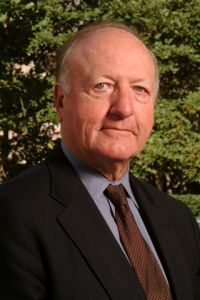 Scripps students have seen the future of higher education—and are curious about its changes. Dr. A. Lee Fritschler, professor emeritus at the School of Public Policy at George Mason University, former assistant secretary for postsecondary education under President Clinton, and the 2014 Woodrow Wilson visiting fellow, engaged with students and the greater Claremont Colleges community in a weeklong series of discussions, classroom visits, and presentations about the future of higher education.
Scripps students have seen the future of higher education—and are curious about its changes. Dr. A. Lee Fritschler, professor emeritus at the School of Public Policy at George Mason University, former assistant secretary for postsecondary education under President Clinton, and the 2014 Woodrow Wilson visiting fellow, engaged with students and the greater Claremont Colleges community in a weeklong series of discussions, classroom visits, and presentations about the future of higher education.
“My conversations with Dr. Fritschler were eye-opening,” says Sawyer Henshaw ’17. “I wasn’t aware of just how much is changing in higher education right now.”
What does this mean for Scripps College? According to Professor of Politics David Andrews, the answer is awareness.
“We don’t necessarily need to reinvent what we do,” says Andrews, “because the faculty and administration at each of The Claremont Colleges believe—and with good reason—that they are offering an education that is not just good, but terrific. But even successful private liberal arts colleges will see some changes.
“We ought to keep our eyes open to what is going on in the larger educational arena. That’s why Dr. Fritschler’s visit was so important and helpful, as he helped bring a wider focus lens to the subject of higher education than we are accustomed to using here in Claremont.”
Dr. Fritschler and students shared ideas and insights on a variety of higher education issues; below are some excerpts of those conversations:
Scripps students: What are some of the current issues in higher education policy?
Dr. Fritschler: Higher education is under incredible pressure at the moment, with important questions being raised about cost, quality, and access. Public institutions are being asked to get by with less taxpayer support and the effects are noticeable. I think that the government’s new education rankings are also a bit flawed, as they rely on quantitative measures of success, which are not always accurate representations of quality. Today, we are seeing more and more changes in—and critiques of—the system.
Scripps students: What are some of the changes you are referring to?
Dr. Fritschler: Moving towards distance learning is a huge change that the business world and public think is easier than I think it is going to be. It’s one of those things that in some areas, such as large intro science courses, could work well, but also has the potential to be ineffective. For example, students have told me that video lectures are far less engaging compared to in-class discussions. There is certainly room for improvement in this area.
Scripps students: What do you think about the political climate of today’s campuses?
Dr. Fritschler: In a study I conducted, we investigated the common perception that faculty in higher education are overly ideological, and tend to push leftist politics in the classroom. We proved this to be untrue, but it has actually led to less civic education on American campuses in the past 40 years, which is incredibly alarming. It’s reassuring to see that the Claremont community seems engaged and that student newspapers and publications are still active.
Scripps students: What are colleges and universities doing well?
Dr. Fritschler: Many colleges are adapting to the times, adding new courses, and incorporating technology mindfully into the curriculum. The number of study abroad and exchange programs is wonderful, and many universities are taking the lead in research. I think it is also important that schools like Scripps continue to have a curriculum that ensures students develop strong critical thinking skills.
For more than 35 years, the Woodrow Wilson Visiting Fellows program has brought prominent artists, diplomats, journalists, business leaders, and other nonacademic professionals to campuses across the United States for substantive dialogue with students and faculty members. Through a week-long residential program of classes, seminars, workshops, lectures, and informal discussions, the Fellows create better understanding and new connections between the academic and nonacademic worlds. The program is managed and administered by the Council of Independent Colleges.

